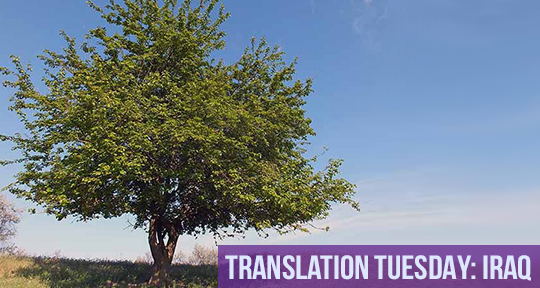In this week’s Translation Tuesday, Mahmoud Saeed brings us a tale that transverses multiple nations and seemingly multiple visions of time. With the transitive nature of a fable and the striking imagery of reality, this story turns and dreams and lingers, much like the sweetness of remembered fruit.
I wasn’t merely delighted when I saw a mulberry tree in Chicago, I was so ecstatic that—as we say in Iraq—I felt I was flying. When we say this, we really feel we are aloft, even though none of us ever did fly into the air whether from happiness or sorrow. The point is that I rushed over to it and stood beneath its branches, which were heavily laden with a crop of delectable fruit. Many mulberries had fallen and created a large, solid circle around it, turning the earth a deep blue-black color. I didn’t even know how long it had been since I tasted a mulberry! Perhaps it had been a quarter century, and that had been in Turkey, where I had eaten white mulberries that gleamed in the sunshine. Each of those mulberries had been almost as long as my thumb, but thicker, and that was the first time I had seen such large mulberries. Their taste was extremely delicious, and each one almost melted between my teeth, filling my mouth with its unique juice. Once this enters the stomach, it is a balm that cures almost all digestive complaints.
In America, there are a few types of mulberry, but none of them rivals the distinctive taste of the mulberry that grows back home in Iraq. The taste here is either sweet-sour or sweet in such a flavorless way that it doesn’t appeal to the taste buds. It may also be sweet but have a bitter aftertaste. In any case, in America I’ve never found a variety of mulberry I like without reservation. When I spotted this particular tree with its black mulberries, I decided to try them and put some in my mouth. READ MORE…

